 Loading...
Loading...-
A Roadmap for a Sustainable Future
Since its inception, the Martens Centre’s project The 7Ds for Sustainability has catalysed interest, fostered dialogue and spurred action. However, as both European politics and global challenges continue to evolve at a rapid pace, we must redouble our efforts. With a new European Parliament and Commission at the helm, the stakes are higher than ever. The interconnected crises—geopolitical tensions, divided societies, climate change, inequality, and the urgent need for competitiveness and prosperity—demand a bold and unified strategy.
I am therefore pleased to present the extended version of the Martens Centre’s strategic document.
The 7Ds for Sustainability: Extended offers a timely and insightful roadmap for navigating this complex landscape. This comprehensive policy book was born out of the collaborative efforts of the Martens Centre research team—under the guidance of Klaus Welle, Chairman of the Martens Centre Academic Council and former Secretary General of the European Parliament—and a group of renowned external experts. The book provides a nuanced and actionable framework for addressing the pressing issues of our time.
The publication outlines seven policy areas: decarbonisation, defence, democracy, demography, de-risking globalisation and digitalisation. These form the bedrock of a more resilient, equitable and prosperous EU. Each chapter provides a comprehensive analysis of the specific challenges and opportunities within these domains, offering actionable policy recommendations to guide the EU’s future trajectory.
I commend the authors for their thoughtful analysis and their commitment to finding solutions that can benefit both present and future generations. By embracing the principles outlined in this book, policymakers, businesses and civil society can work together to create a more sustainable future for the EU.
I am confident that this publication will serve as a valuable resource for policymakers, scholars and the European public alike, inspiring and guiding our collective efforts towards a more sustainable future. The 7Ds for Sustainability: Extended is more than just a set of principles: it is a catalyst for change and action and provides a much-needed compass for navigating the challenges and seizing the opportunities that lie ahead.
Have an inspiring read!
Mikuláš Dzurinda, President of the WMCES
Former Prime Minister of Slovakia
Climate Change Defence Democracy Demography Digital Economy EU Member States Foreign Policy Leadership Migration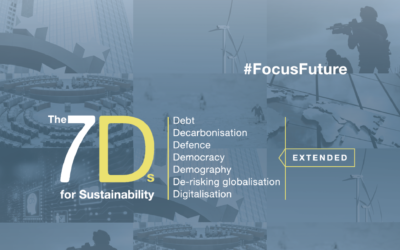
The 7Ds Extended
The 7Ds
31 Dec 2024
-
The European welfare state is being challenged by new realities. People’s outlooks on life have changed dramatically over the past decades, including their views on religion, the family and work. The consequences of these societal changes include rising life expectancies and stagnating fertility rates that are insufficient for the natural increase of the population. Humanity’s efforts to curtail overpopulation and increase longevity have caused the ageing of our societies, a trend that has been under way for decades.
Our institutions and policies are not ready for these developments. National social security systems lack sustainable funding. Labour market rules are lagging behind the needs of the ageing societies, and these rules do not capitalise on the experience that older workers can bring in. In general, pronatalist policies in the form of cash transfers to young families have not fulfilled their objective. The EU’s population has been growing only thanks to immigration from outside the bloc, but family reunification—the most frequent type of EU-bound immigration—has not improved the ratios of workers to non-workers. In Southern and Eastern Europe and in many regions elsewhere on the continent, depopulation and emigration are compounding the problems caused by ageing. Moreover, the Covid-19 pandemic has contributed to a worsening of mental health. This has impacted young people with particular severity, keeping them out of schools and jobs.
To mitigate the effects of population ageing and the other phenomena mentioned, it is incumbent on the EU’s national governments to create institutional environments that increase human capital and make it easier for women and men to both pursue a career and raise a family. As for the numbers of children born, the fact that fertility rates in some EU countries are higher than in others suggests the crucial importance of national social policies. It used be assumed that a woman who ‘stays at home’ is more likely to have children than a woman who ‘pursues a career.’ Contrary to that outdated notion, it now appears that having stable work allows those who wish to have children to choose to do so.
Health care, affordable housing and lifelong learning have become crucial for maintaining the well-being of the population and a productive labour force. The participation of women, older people, young people and immigrant groups in the labour market must be increased. The state pension age should be increased, albeit with elements of flexibility to allow for individual choice. Finally, innovative solutions are needed to address both depopulation in some countries and areas and the growing regional imbalances within the EU.
Demography Migration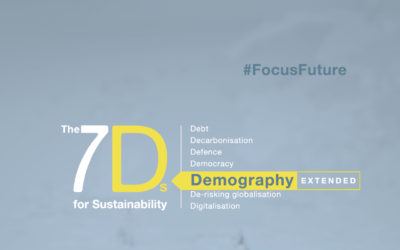
The 7Ds – Demography Extended
The 7Ds
30 Dec 2024
-
The EU is grappling with a looming crisis that has slipped under the radar amidst the chaos of geopolitical instability: a severe labour shortage, worsened by accelerating demographic decline. This is not just a workforce issue—it is a threat to the very fabric of Europe’s future. As populations dwindle, particularly in peripheral regions, the labour deficit grows more alarming by the day.
Drawing on best practices and informed by the current political and socio- economic landscape, this policy brief argues that attracting young global talent, particularly through education, is no longer a choice but a necessity to combat depopulation and ignite economic revival. This policy brief sets forth urgent recommendations which include establishing clear migration targets, strengthening reskilling and civic–linguistic training programmes for migrants, fully digitising migration-management processes and fostering cooperation with source countries. Together, these measures should aim to build a compelling ‘European Dream’, attracting and retaining the skilled individuals essential for the continent’s future prosperity.
Demography Labour Migration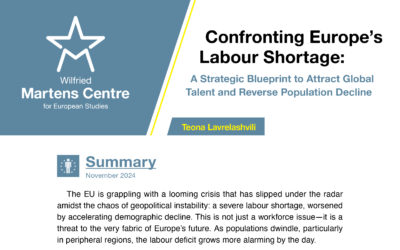
Confronting Europe’s Labour Shortage: A Strategic Blueprint to Attract Global Talent and Reverse Population Decline
Policy Briefs
12 Nov 2024
-
Demography presents a significant challenge for Europe, with implications that span from the EU’s economy and strategic autonomy to its social composition and functioning. An ageing Europe will find it increasingly difficult to maintain its role as an international actor, and ultimately, to prosper.
According to official figures from the European Commission, by 2070, Europeans will account for only 4% of the world’s population, down from 6% today. By 2050, the proportion of people over 65 will increase to around 30%, up from 20% today. A crucial indicator underlying these projections is the current birth rate: today, there are only 1.5 births per woman, compared to the 2.1 needed to maintain a stable European population.
Policies have already been discussed, including those by the Martens Centre in its publication “The 7Ds – Demography in Depth”, to directly enhance the human resources available in Europe and address the demographic problem. The European Commission has adopted and presented the Demography Toolbox to consolidate experiences and best practices from all European countries, highlighting an integrated approach to each country’s various challenges.
However, it is essential to explore the root cause of the issue. Why do Europeans choose not to have children, and why is the birth rate so low? Undoubtedly, the reasons are numerous and vary significantly from country to country. However, there may be some common denominators in this complex equation.
In Greece, for example, the newly established Ministry of Family and Social Cohesion, under the leadership of Minister Sophia Zacharaki, is preparing a new strategy to address the demographic issue with a package of measures. This strategy is data-driven and science-based, including pioneering research. For the first time, the reasons people decide not to have children were studied in depth using a combination of quantitative and qualitative research.
In the qualitative survey of couples of childbearing age, couples’ prioritisation in their lives was examined. The survey revealed that the top priority for couples was the desire to “enjoy life,” with the choice to have a family and children ranking among the lowest priorities. Notably, during free discussions, participants without children primarily talked about their travel plans and pets, while the topic of children rarely arose on its own.
The survey also highlighted a shift in family dynamics: a few decades ago, family power was in the parents’ hands, but now, in many Western societies, there is a phenomenon known as ‘enfants rois’. These ‘child kings’ not only hold the family power, but are also unready to grow and hand their crowns to the next generation.
More than half of the respondents (6 out of 10) said they do not plan to have a child and do not consider it likely. Although initial responses often cited financial concerns, further investigation revealed that most are unwilling to change or sacrifice their lifestyle, career, or life trajectory to assume a parental role.
In this context, the child is perceived as a burden that much of our society does not wish to bear.
The survey’s findings suggest that significant institutional interventions are needed, as young families require a more supportive environment to feel secure in their decision to have children. New housing policies and measures to address contemporary social and personal needs are also essential. These should help balance personal and professional careers with parenting, providing stable support structures for children and families while ensuring a high quality of life for parents.
However, something deeper and more complex than a legislative and fiscal intervention is required. We need to develop a new European value system in which collectivity transcends individuality, and personal well-being can coexist with social development responsibilities.
We need new social models and a new paradigm of collective effort that would redefine and emphasise “social purpose”.
Only within such a framework could we create a new emotional foundation that encourages investment in procreation, reversing the dramatic trends of our demographic challenges. Forming a family and having at least one child could become a higher priority in this environment.
Panagiotis Kakolyris Demography EU Member States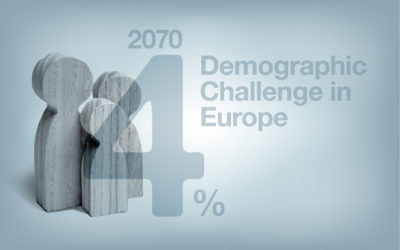

Panagiotis Kakolyris
Answering the Central Question Behind the Demographic Challenge in Europe
Blog
28 Aug 2024
-
Demography
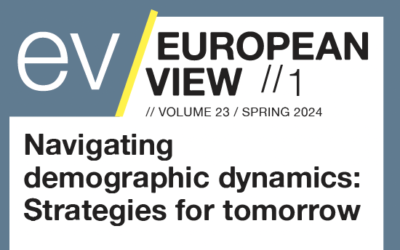
Navigating demographic dynamics: Strategies for tomorrow
European View
16 May 2024
-
The European welfare state is being challenged by new realities. People’s outlooks on life have changed dramatically over the past decades, including their views on religion, the family and work. The consequences of these societal changes include rising life expectancies and stagnating fertility rates that are insufficient for the natural increase of the population. Humanity’s efforts to curtail overpopulation and increase longevity have caused the ageing of our societies, a trend that has been under way for decades.
In 2023, the Martens Centre published its 7Ds for Sustainability strategy document. This text comprised 175 proposals for the next legislature to future-proof EU policy in the areas of debt, decarbonisation, defence, democracy, demography, de-risking globalisation, and digitalisation. Sustainability was chosen as the guiding principle to ensure that the policies reconcile the needs of both the present and the future, and systematically include the interests of the next generations.
The 7Ds document has already inspired reflection on what to do over the next five years. These discussions are based on Christian Democrat and conservative thinking and the available in-house expertise of the Martens Centre. For the next phase of intense discussions about the programme to be implemented during the 2024–9 legislature, the Martens Centre has invited renowned external experts to put forward their own, more extensive proposals based on the original document, thereby deepening the available expertise. It is hoped that these proposals, published at the beginning of April 2024, will help to clarify the way forward at a critical juncture, when the European Parliament, the European Commission and the European Council are negotiating on and finalising their strategic priorities.
Demography EU Member States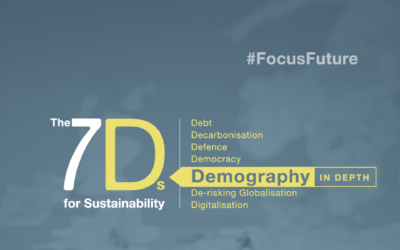
The 7Ds – Demography in Depth
The 7Ds
22 Apr 2024
-
Europe is on the brink of a demographic revolution. The age pyramid is changing shape, with a growing proportion of our population over the age of 65, and a significant number over 80. Children born today may well live to be centenarians. This shift, coupled with an overall decline of both population and workforce size, demands a profound rethinking of our institutional, political, economic, and cultural frameworks, which are currently designed for shorter lifespans.
From Ageing to Longevity: A Paradigm Shift
Historically, a rising proportion of older people and the ageing society led to the development of a silver economy, focused on the economic opportunities arising from the ageing population’s specific needs. However, this perspective, anchored in the traditional three-stage model of life (education, work, retirement), limits our view, reducing seniors to their purchasing power and narrowly focusing on end-of-life issues like pensions, life care, and healthcare.
The longevity economy emerges as a transformative concept. It acknowledges not just ageing, but a significant shift in life expectancy, compelling us to exploit the flexibility and capabilities of age. This new economy isn’t just about living longer: it’s about ensuring that these extended years are healthier, more productive, and more fulfilling. It transcends a focus on older age groups and capitalises on the longevity dividend across all ages, recognising the valuable social and economic contributions of older individuals beyond their health needs.
Longevity Society: A Broader Challenge
The longevity society is about restructuring social and working lives to capitalise on the extra time we have, starting from its very beginning, as ageing begins the moment we are born. This new longevity society requires tailored policies for all ages, that have a positive impact on how we grow old and that foster an active and healthy lifestyle at all ages.
We must empower this new older generation and give them a stronger sense of purpose, allowing us to capitalise on their knowledge and experience. This narrative breaks from the negative discourse typically associated with ageing, instead being one of novelty, refreshment, purpose, and value.
This narrative is about embracing a multi-stage life cycle that manages transitions and creates opportunities across generations, promoting intergenerational equity and a positive approach to increased life expectancy.
Europe’s Role in this Transformation
Understanding and adapting to this new reality is not without its challenges. We have started doing so with a number of initiatives, such as the Green Paper on Ageing and the Atlas of Demography. Europe has a critical role in supporting Member States through these demographic shifts, by fostering healthy longevity and equipping Europeans with the tools for longevity literacy. This is why the European Commission recently adopted the communication on Demographic change in Europe: a toolbox for action, which lays out all the available instruments at the disposal of all layers of governance; EU, national and regional. These are designed to work towards a society where everyone, regardless of age, can thrive and enjoy the benefits of demographic change.
As we navigate this transition, we must embrace the longevity society and economy. This shift requires not just understanding, but also action. To make this vision a reality, the European Union must embark on several key initiatives. We should encourage flexible retirement schemes and workplace adaptations that recognise the value of older workers, allowing them to contribute their skills and experience for longer. Increased investment in lifelong learning and re-skilling programmes will ensure that our ageing population remains dynamic and relevant to our economy. In healthcare, a shift towards preventive measures and personalised medicine will not only extend life, but also improve its quality. Additionally, urban planning must evolve to create senior-friendly cities that are accessible and inclusive for all, promoting intergenerational interaction and community cohesion. These actions, combined with policies that address disparities in health literacy and access to quality and affordable care, will pave the way for a more inclusive, productive, and vibrant longevity society.
We must rethink our policies, institutions, and social norms to be fit for this new demographic reality. By doing so, Europe can lead the way in this global shift, creating a society where extended lifespans are a source of strength, vitality, and prosperity.
Dubravka Šuica Demography Society

Dubravka Šuica
Navigating the New Age: A Toolbox for the Demographics of Tomorrow
Blog
31 Jan 2024


